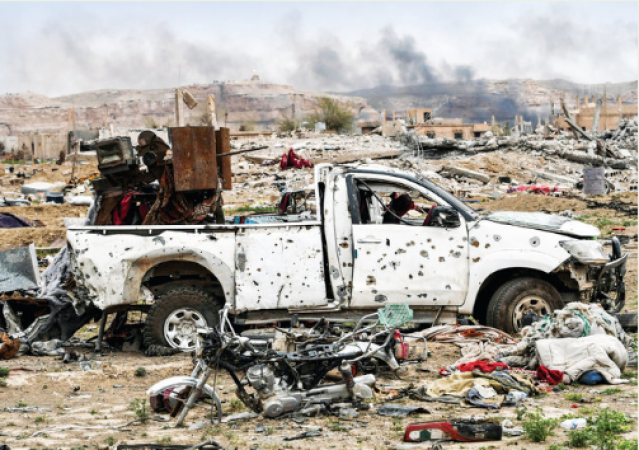
Qamishli, Syria: In the governorates of Raqqa and Deir Ezzor, the terror organisation Daesh attacked Syrian regime soldiers multiple times during the second week of August, resulting in dozens of fatalities and numerous injuries.
Considering the increasing frequency and severity of attacks in Syria's central and eastern regions, some might question whether the organisation was truly defeated when its defeat was declared in 2019.
The men and women of the Syrian Democratic Forces, the multiethnic, US-supported force that oversaw the ground campaign against Daesh in Syria, as well as the residents of the autonomous areas of northern and eastern Syria, celebrated a happy occasion on Saturday, March 23, 2019.
Also Read: Major fires are being fought by Greek firefighters on several fronts
People from all walks of life were thronging the streets of cities in northeastern Syria to celebrate Daesh's ultimate defeat at the Battle of Baghouz, from Manbij to Kobani, from Raqqa to Hasakah and Qamishli.
They had no idea that despite losing territory, the group would continue to operate out of bases both inside and outside the nation, using them to conduct operations in Syria.
"(Daesh) employs various frameworks to uphold its extremist ideology," Syrian Kurdish journalist and CEO of Aso News Network Sardar Mullah Darwish..
Also Read: Giuliani Surrenders Amidst Charges Tied to Georgia 2020 Election After $150,000 Bond Imposition
The group "relies on cells spread out in different areas in the governorates of Raqqa, Deir Ezzor, and southern Hasakah, and particularly in the Badia, where they are in areas that are not fully controlled by the coalition, the SDF, or even the armed forces of the regime and other military forces," the official said.
Darwish added that Daesh relies on financial extortion to survive, threatening people who are wealthy and affiliated with foreign or local NGOs. He continued, saying that the group tries to blend in with civilians by riding motorcycles and donning the black niqab veil.
Attacks by Daesh have been reported in both regions controlled by the regime and those by the SDF. These assaults are attempts, in Darwish's words, "to show continued presence and strength."
The response is made more difficult by Syria's divisions.
According to Abu Omar Al-Idlibi, commander of the SDF-aligned Northern Democratic Brigade, "whatever remains of the terrorist group's remnants in our regions is limited to sleeper cells, and they are dealt with directly by our security and military forces in coordination and cooperation with the Global Coalition."
As for the rest of Syria's geography, "Daesh is still strong because it serves as a justification for the presence of its backers, Russia and Iran, as well as one of the factors contributing to the survival of the Syrian regime."
Al-Idlibi thinks Iran is using the existence of Daesh as justification for escalating its military presence in Syria. Iranian-backed pro-regime militias, including the Islamic Revolutionary Guard Corps, Basij Forces, Harakat Hezbollah Al-Nujaba, Kataib Hezbollah (also known as Iraqi Hezbollah), the Badr Organisation, the Abu Al-Fadl Al-Abbas militia, the National Defence Forces, Liwa Al-Quds, Liwa Fatemiyoun and Liwa Zeynebiyoun, are all deployed across areas where Daesh remains strongest.
Since losing the ability to control territory in Syria, Daesh has launched over 1,400 attacks on military and civilian targets throughout the nation, killing over 3,000 people.
Also Read: The potential demise of Prigozhin has not surprised US President Joe Biden
More than 320 of these attacks were carried out, according to statistics drawn from publicly accessible datasets compiled by the Armed Conflict Location and Event Data Project, even after the passing of Daesh leader Abu Ibrahim Al-Hashimi Al-Qurayshi in 2022, who succeeded Abu Bakr Al-Baghdadi as the group's leader.
In the first half of 2023 alone, direct Daesh attacks claimed more than 262 lives nationwide, the majority of whom were civilians, according to the Monitoring and Documentation Department of the local North Press Agency.